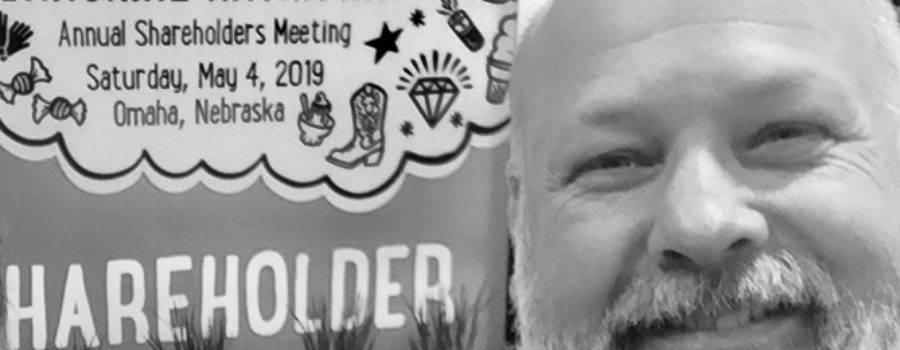Learning From the Masters: A Weekend with Warren and Charlie
Crowds of sleepy yet excited people stumbled off shuttle busses and took their place at the end of a block-long line. Travelers from around the planet quietly queued up in the dark several hours before the doors opened at 6 am, and released the crowd to grab the open seating in general admission fashion.
For the third year in a row, we were attending the annual Berkshire Hathaway shareholders meeting.
All of the people there had three things in common:
- All were BRK.a or BRK.b shareholders
- All carried notepad to capture the day’s events
- All were waiting to sprint for good seats
The crowd was a puzzling mix of humanity.
- Some were Wall Street professionals, and dressed to the 9’s.
- Some were casual in shirtsleeves, shorts, and comfortable shoes.
- Some looked like they didn’t have a penny to their name.
This is one event where it’s extremely hard to tell whom are the multi-millionaires. My experience would say that making judgments by someone’s clothing and outward appearance can be very dangerous. We’ve literally seen billionaires in blue jeans stand in line for a free light beer.
As a result, everyone in line treats each other with a significant amount of respect.
Today’s event was the pinnacle of the weekend, a day-long Question and Answer session with Warren Buffett and Charlie Munger.
They spend 8 hours giving impromptu answers to questions from Journalists, Analysts, and Shareholders before holding a live Annual Meeting for the 4thlargest company in the world.
The question are tough. Not one single softball. Even the one asked by a 9 year old sounded like an excerpt from her MBA thesis.
Everything from questioning decisions made and actions taken by the company over the last year(s), reflective and theoretical musings about their history and founding, and the inevitable requests for the Oracle of Omaha to predict the future for industries, sectors, and the economy as a whole.

It’s not about Finance
I’ve been a shareholder since the crash of 2008. The crash provided a rare opportunity to grab some “great companies at a fair price” as Warren says. His BRK was at the price of a lifetime.
As an active duty Navy pilot, coming to the shareholder’s meeting was impossible. After transitioning to the private sector and relocating to the Midwest in 2016, we haven’t missed a meeting.
We’ve come to know many impressive people attending this meeting. Nearly all of the other shareholders in our sold-out hotel are Hedge Fund Managers, Financial Planners, or heavy duty CEO’s and CFO’s. Names I won’t mention, but everyone would recognize.
My ‘Berky Buddies” like to obsess over all of the minute details of every batch of new deals. Although I understand the language and impact of these financial tactics, my attention wanes at these details and my mind tends to wander.
As a leadership expert and executive coach, my interest in listening to two elderly experts is to soak in the leadership and management lessons that have grown a company for nearly 60 years. The wisdom and perspective of these two titans is incredible, having seen every possible management fad over two 70-year careers.
Experience has shown Warren and Charlie what really works.
These lessons in management and personal connection far overshadow the mere financial success of Berkshire Hathaway and their subsidiary companies. It is practical leadership wisdom that works.

“Delegate almost to the point of abdication.”
Over time, my wife and I have met more than a dozen CEO’s of Berkshire Hathaway’s subsidiaries. Each one of them has had very similar stories about Warren’s and Charlie’s famously hands-off leadership.
They truly live up to their mantra of hiring good people, and letting them succeed.
One CEO put it very simply, “They told me to do whatever I thought was best, but avoid two things: don’t do anything stupid, and don’t lose money.”
Very clear guidance, in what we called the Commander’s Intent. The private sector calls it Vision. In any case, it seems simple enough to be easily followed.
This liberation from restrictive home-office constraints has allowed this CEO’s company to explore options they know will be successful without the risk of “not being successful enough.” He did not have to fear being fired for making a bold decisions, as long as they showed promise.
His 140-year old clothing company was acquired by BRK about two decades ago. They are currently exploring the “vintage” trend by breaking out designs popular in the 1940’s, and giving them only a functional update.
This allows them to capitalize on current fashion demands, and simultaneously poke their largest competitor for being comparatively young.

Success is People, Making Good Decisions
Being led by two exceptional leaders is the reason why Berkshire Hathaway has enjoyed runaway success in the last several decades. Playing the long game, both financially, ethically, and in their leadership style, has allowed this company to avoid many of the pitfalls caused by short-term thinking.
It’s the reason 45,000 people traveled from around the planet to queue up at 5 am, and sit captivated in a packed concert hall for 8 hours to cheer two 90 year olds discussing finance.
It’s the reason why they are so admired by businesses and individuals alike. And, it’s the reason why I’ll be back next year learning from the masters.


You must be logged in to post a comment.